- Home
- Mack Reynolds
Deathwish World Page 10
Deathwish World Read online
Page 10
Roy said, scowling, “How do you mean society provided for my future? I didn’t ask to become a complete drone. It was foisted on me.”
The newsman nodded again and put down his fork, giving up the food for which neither of them had found enthusiasm. “You’re an exception. But over a century ago society was already preparing for the day of the prole. Most kids at that time were already spending more time watching TV than they were spending in school. Oh, there were good schools in the United States, such as MIT, Johns Hopkins, Berkeley, Caltech, and so on. And the good schools turned out possibly five percent of the college graduates of the time. But the rest of the school system was a shambles. Kids got out of grammar school unable to read and write. Hell, many of them graduated from high school unable to function as adults—couldn’t make out an application, couldn’t keep up a checkbook. Their reading was confined to comic books or strips in the newspapers, or painfully wading through the sports pages. They got their news, to the extent they were interested at all, from TV commentators.”
“I still don’t see how that leads to society preparing for the future,” Roy said, scowling still. This wasn’t gospel as laid down by the Wobbly movement.
“Our people were being prepared for becoming proles, unemployables. In modem society you’ve got to have a good education to hold down a job. Fine, the five percent needed today got a good education. It’s not necessary that the ninety percent have one. In fact, it’s a disadvantage. An educated man, unemployed, is a potentially dangerous man. He can think, and question, and act on the answers he comes up with. Our educational system was weaning our youth away from an aggressive approach to life, taking the guts out of them, preparing them for their future as proles.”
Roy said softly, still in rejection, “So what’s our future? What lies ahead for us?”
“Probably more of the same. And the upper class will continue to get richer and smaller, as it eliminates the lower levels of its own class, who are thrown down into the ranks of the proles if their fortunes are lost by whatever means—including being pissed away.”
The Wobbly looked at him, thoughtfully. He said, his voice slow, “You’re more interested in these things than you’ve admitted, aren’t you, Forry? How come you picked a Wobbly on this project of yours? Why not a Luddite, or Neo-Nihilist, or possibly a Libertarian? And why me?”
Forry Brown tossed his napkin to the table and looked at his wrist chronometer. “We have to get going,” he said, bringing his card from his pocket. “You weren’t my first choice, Roy. I approached another National Organizer of the Wobblies before you. He evidently wasn’t cut out to be a martyr. He turned me down.”
Chapter Seven: Lee Garrett
Cary McBride entered the Nuits St. Georges restaurant, his eyes on his wrist chronometer. He looked around hurriedly, frowned, and then went into the bar lounge.
Lee Garrett sat at a small table, a glass before her. She seemed not at all impatient.
He came up to her, his smile just slightly drawn. “Ms. Garrett, of course?” he said. He took in the glass with its light golden contents. “By George,” he said. “Not a drink before eating the specialties of Burgundy?” He took the table’s second chair. “I’m Cary McBride.”
She smiled brightly at him, her almost unbelievably blue eyes taking in his male fashion model appearance. Not only was Cary McBride handsome, in the best upper class tradition, but he was dressed for the part. His suit, shirt, and shoes were exactly what the youthful senior executive in Manhattan was wearing, not just this year, but probably this week.
She said, after shaking hands, “Only a sherry.”
“Tio Pepe, I should hope,” he said. “Anything stronger or less dry would play havoc with one’s palate.”
She did a little laugh, as though he were joking. “Tio Pepe is so dry it gives me heartburn.”
“Then not another sip of that,” he told her severely. “Andre would be desolate. Shall we go to our table?”
He took her arm and led her to the dining room. Lee was dressed in green Irish tweeds which would have denigrated any figure less superb than her own. She looked very businesslike, her simple white blouse and low heels very sincere.
The maitre d’ greeted them unctuously and led them to a table tucked intimately away in a small nook. The decor was early French bistro: reproductions of Toulouse Lautrec’s posters, aged advertisements of Ricard, Pernod, and a Rheims champagne. The room was moderately full of prosperous diners.
Andre put menus before them, brought forth a pad and stylo, and looked inquiringly, politely, and most earnestly at Cary McBride.
Cary McBride said to Lee, “The menu is in French. Shall I order?”
“Please do,” she said, putting down her own carte.
Consulting with the headwaiter as he went, very seriously indeed, Cary McBride ordered as their first course Oeufs en Cocotte Bourguignonne, with a Meursault ’48 to accompany it. When the wine arrived, Andre again presided pouring a small amount into McBride’s tulip-shaped glass. He sipped it carefully, after he tested the bouquet, and thoughtfully pursed his lips.
Andre murmured, “Le vin est a votre gout?”
“Excellent,” Cary McBride nodded, and the headwaiter filled both glasses two-thirds full.
Eggs a la Bourguignonne turned out to be poached in red burgundy, and for a moment, both were silent as they sampled.
Cary McBride said, “A pity to discuss business while eating, my dear, but I understand that you were contacted, as planned, by a member of the Anti-Racist League.”
Lee nodded. “Yes,” she said. “I’m afraid I muffed it.”
“Not to worry, my dear. What went wrong?”
“I underestimated him. He was a black; well-educated. What tipped him off, I have no idea, but he saw through me. I suppose it was rather humorous. He pretended to get somewhat tipsy and, ah, pretended to make a rather crude play for me.”
His eyebrows went up.
She shook her head and made a mouth in self-deprecation. “I became terrified, like a simple ninny, remembering all that I’d heard about rape, and revealed that I wasn’t truly material for the Anti-Racists. He told me off very efficiently, greatly amused.”
“I see. Then your cover is blown, so far as the Anti-Racist League is concerned.”
“I’m afraid so.”
“Not to worry,” he said again. “Ah, the duck.”
The Canard a L’Orange arrived with the Richebourg ’65 he had ordered, and again went through the wine-tasting ceremony.
When the waiter had retired he said, “You were not alone. The Foundation has several, ah, agents making the same attempt to penetrate the Anti-Racist League. You were but one. Others, it is to be assured, will be more successful.”
She said, “I wasn’t told a great deal about the purpose of my mission. Actually, in spite of my silly scene with Horace Hampton, I am not particularly prejudiced so far as minorities are concerned. I was rather surprised that the Race Research Foundation was interested in infiltrating his organization. I thought its research would be along other lines.”
“It is but one ramification of a much broader project. You see, Lee, the Anti-Racist League is a racist organization itself.”
“I don’t understand.”
“In much the same way that the Zionists were.”
She frowned slightly at him. “I’m not anti-Semitic, either.”
“Nor am I, nor is the Foundation. We’re far above such ridiculous postures. But there are most pertinent matters involved. The Anti-Racist League was not of particular import to us so long as it was active in the original fifty states alone. The minorities they represent numbered but some sixteen percent of the population; no great danger to our status quo. However, they are now, ah, beginning to spread into Latin America and other areas of the new United States of the Americas.”
She scowled down at her plate. “I don’t believe I follow you.”
“These new citizens have the vote, Lee. There are eno
ugh blacks in Haiti, Jamaica, and even the Guianas to assure that their senators and representatives will be represented in Congress by blacks—if steps are not taken. It’s equally true for Mexico, Central America, and the parts of South America which are chiefly Indian.”
“So the purpose of the Race Research Foundation is…”
“Ultimately, to maintain the status quo. To see that our people, yours and mine, do not vanish from the positions of power they now assume. Ah, but here is the cheese. I have ordered a selection of Roquefort, Brie, and Chevre.”
The cheese was accompanied by a bottle of Rose d’Anjou, following which the waiter brought Crepes de Chapitre.
Lee, who had been silent and thoughtful through these culinary wonders, said at one point, “But since my cover has been blown, as you put it, I am no longer of value to the Foundation.”
He smiled at her condescendingly. “We’ll discuss it later in my office, my dear.”
When they finished the meal, Andre returned, bowing unctuously again.
He said to Cary McBride, “Ca vous a plu, le repas, Monsieur McBride?”
“Il etait superb, Andre,” the other told him grandly.
Andre looked at Lee. “Et Madam?”
Lee said, “Mes felicitations au chef pour ses crepes. Ils etaient commes des diners de George Garin au Chateau du Clos de Veuheot. Il y avaient des autres nobles efforts.”
“Merci, Madam.” Andre bowed deeply and was gone.
Cary McBride gaped at her. “Parisian French,” he said accusingly.
“My father was in the diplomatic corps. In Paris, I attended the Lycee Janson de Sailly. I also have Spanish, Portugese, and Italian, and can get along in German. My Russian is atrocious.”
“All Russian is atrocious,” he smirked, then saw irritation in her face. “Or did I make a mistake?”
She said, evenly, “Several. Never order such a wine as Richebourg with such a dish as Canard a L’Orange. Nor any other wine, for that matter. The acid of the orange sauce destroys the enjoyment of any great wine. The sole exception is Bouzy, from the Champagne district. If you must order Richebourg it is worthy of a much greater dish, such as Venison Grand Veneur or Lievre a la Royale.”
“I see,” he said coldly. “And what else?”
“None of the cheeses were from Burgundy. A Brillat Savarin or ripe Epoisse would have been preferable. And Rose d’Anjou, a suspect wine at best, is anathema to both Burgundy food and any cheese and most certainly should never do for the crepes, which were excellent, as I told the maitre d’. By the way, his French has a horrible Brooklyn accent.”
“I see,” he said. “Shall we go?” He stood, tossing his napkin to the table.
She looked up at him. “Why? My one assignment for the Race Research Foundation came a cropper. I should have looked further into the whole thing before undertaking it. If I had, possibly I would have refused the job. I was too thrilled at the prospect of actually being employed when the computer selected me to work for you, Mr. McBride. Now, even if you did have some position I could hold down, I’m not sure I would choose to be associated with such a pompous superior.”
He grinned suddenly, which completely altered his face. He said, “Good. We’ve got some things to discuss.”
She shrugged in resignation, dropped her own napkin to the table, and stood. “I can’t imagine what,” she murmured.
At the desk, he brought forth his card and placed it in the payment slot, saying, “Please add a twenty percent tip.”
“Thank you, sir,” the screen said.
As he was returning his credit card to an inner pocket, he turned his eyes to Lee and smiled again. “How’s my French?”
Her face was expressionless. “Only fair,” she said. “You seldom acquire a proper French accent outside France or Switzerland. I suspect that most of your instructors were Americans. The French are fanatical about accent.”
“I surrender,” he said, taking her arm.
The Manhattan office of the Race Research Foundation was within easy walking distance and since it was located in the vicinity of New Columbia University, it made for a pleasant stroll. They maintained silence during the walk and Lee Garrett was surprised at the fact that he was still amused. This was a different Cary McBride. Gone was the affected front. What in the world was this all about? The fluffing of the job wasn’t particularly important. But what she had told Horace Hampton had been partly correct. She was tired of the frivolous life and would have liked something worthwhile to do.
The Manhattan offices of the Race Research Foundation were modest. In the outer office were three desks, two women and a young man at them, equipped with the standard vocotypers, phone screens, and library boosters for consultation with the National Data Banks. All greeted Cary McBride by his first name, which surprised Lee. She had expected a stuffy atmosphere, at best.
He didn’t bother to introduce her. His private office turned out to be a room of warmth and informality. He seated her in a comfortable chair before rounding the desk and taking his own place.
She still didn’t know why she had come. Now that she had fluffed the Hampton contact, she couldn’t see how she could possibly infiltrate the Anti-Racist League.
Cary McBride, smiling again, picked up a sheaf of papers from the desk and said, “This is your Dossier Complete. It reports that you attended the Lycee Janson de Sailly, one of the oldest private secondary schools in Paris. You were there for several years, invariably top in your class.”
She glared indignantly at him. “What the devil are you doing with that? The Dossier Complete of any citizen can be consulted only by proper authorities for adequate cause. You need the highest priority in the National Data Banks to…”
He held up a hand and grinned his boyish grin at her. “Exactly.” He watched suspicions chase across her face and then nodded. “We enjoy such a priority.”
She was staring at him in sudden realization. “You knew all the time, there in the restaurant, that I spoke French.”
“Guilty as charged.”
“But… then why did you pretend to make such a fool of yourself before that… that Brooklyn Frenchman?”
He grinned once more. “Lee, the organization of which we are but one subsidiary makes every effort to recruit the best personnel. Practically every employment position filled in the United States goes through the National Data Banks computers. The computers select the most suitable person available for each job.” He paused, then winked. “But we get to the data banks before the government computers even begin their selections. We skim the cream of the crop.” He could see her confusion. He tapped the sheaf of papers before him.
“Lee, the Dossier Complete is possibly the most comprehensive tally of a citizen’s life ever assembled. It begins before your birth, references going beyond your grandparents. And, from your birth, every aspect of your life is checked: health, upbringing, education, sports accomplishments, criminal record, employment record, travels, and on and on. Among other things checked is your ability quotient. Your dossier builds profiles of your verbal and numerical abilities, spatial ability, memory, speed of reflexes, dexterity, mechanical aptitude, emotional maturity, veracity, sensory limits, natural charm, persistence, neurosis, powers of observation, health, and a few others.”
She smiled. “Depressing idea. We’re all confronted with these confounded tests every few years. That is, if we have any interest in work or running for office. Maybe I should’ve refused to take them. But what’s all this got to do with…” He held up a hand. “There are a few things, my dear, that can’t be tested. Luck, for instance.”
“Luck! There is no such thing.”
“I’m afraid there is, just as there is accident-proneness, which also defies computer analysis. Even though you were given unbelievably high marks, suppose that when I entered the Nuits St. George I found you wearing two left shoes, or you were hunched up in posture, or you were dressed in khaki shorts and a man’s shirt like a prole. Suppose further that
when subjected to a ‘pompous superior’—I believe that was your term—you were willing to accept him as your boss.”
She laughed. “That was all put on! You were testing me.”
He grinned back and nodded. “If you hadn’t the other qualifications we were looking for, you might still have been employed—somehow. But we also wished to check your poise, grooming, physical attractiveness, and sensibilities. You passed with flying colors.”
She looked at him levelly. “So, if I passed your exam that goes beyond the Ability Quotient tests, just what is this position you have in mind? I’ve already bombed out as an infiltrator of the Anti-Racist League.”
The other leaned back in his swivel chair and was silent for a few seconds. “What do you know about the World Club?”
“Why, I suppose what everybody else knows: it’s the think tank to end all think tanks—a multinational philanthropic organization which digs into socioeconomic problems confronting the world. Lagrange Five and Asteroid Belt Islands, too, for that matter.”
He nodded but said, “It’s a great deal more than that. It also keeps track of the population explosion, resources, pollution, religion, the tendencies toward the police state, terrorism, and… racism. For your ears only, the Race Research Foundation is a subsidiary of the World Club. That would be a shocker even to the most diligent news media expose experts.”
She was wide-eyed now. “But what has this got to do with me?”
“You’ve been selected to work directly under the Central Committee, which likes a low profile. For the media, it doesn’t exist.”
She was too flabbergasted to speak.
He took up a stylo and readied it over a paper pad. “Before we go further into that, suppose we get the details of this interview you had with the black from the Anti-Racist League. His name?”
“Horace Hampton. Known as Hamp.”

 Happy Ending
Happy Ending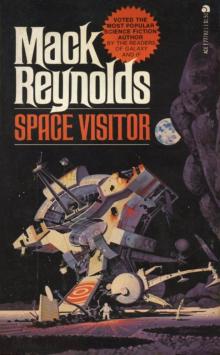 Space Visitor
Space Visitor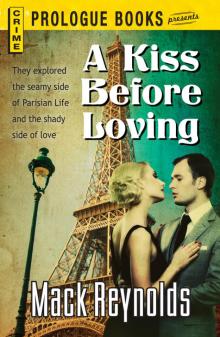 A Kiss Before Loving
A Kiss Before Loving Episode on the Riviera
Episode on the Riviera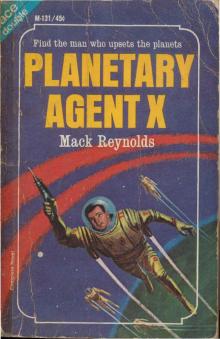 Planetary Agent X
Planetary Agent X Rolltown bh-3
Rolltown bh-3 The Second Mack Reynolds Megapack
The Second Mack Reynolds Megapack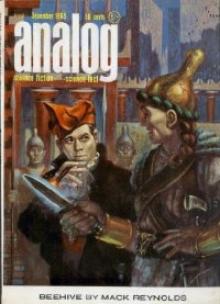 Dawnman Planet up-2
Dawnman Planet up-2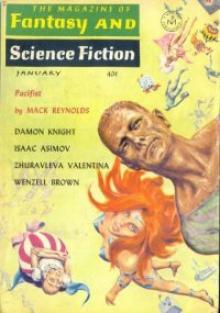 Pacifist
Pacifist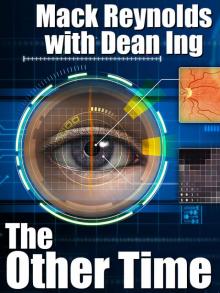 The Other Time
The Other Time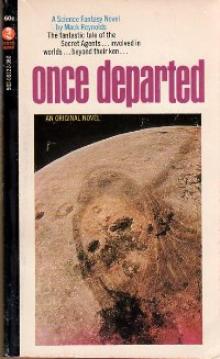 Once Departed
Once Departed IQ
IQ Computer War
Computer War Earth Unaware
Earth Unaware The Rival Rigelians up-3
The Rival Rigelians up-3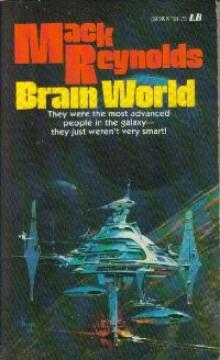 Brain World up-7
Brain World up-7 Star Trek - TOS - Mission to Horatius
Star Trek - TOS - Mission to Horatius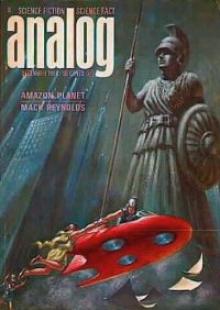 Amazon Planet up-5
Amazon Planet up-5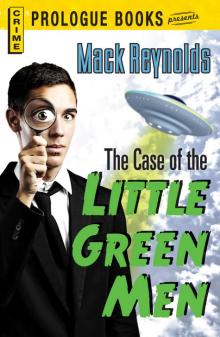 The Case of the Little Green Men
The Case of the Little Green Men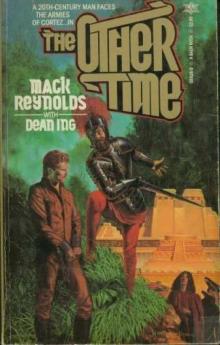 Other Time
Other Time The Mack Reynolds Megapack
The Mack Reynolds Megapack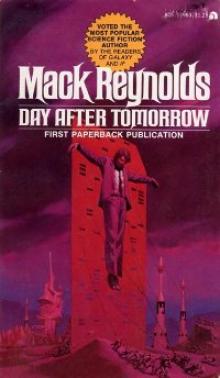 Day After Tomorrow
Day After Tomorrow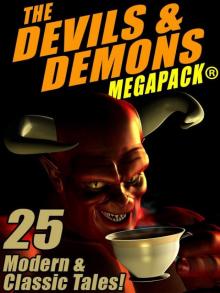 The Devils & Demons MEGAPACK ®: 25 Modern and Classic Tales
The Devils & Demons MEGAPACK ®: 25 Modern and Classic Tales Mission to Horatius
Mission to Horatius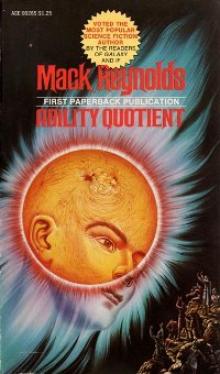 Ability Quotient
Ability Quotient Galactic Medal of Honor
Galactic Medal of Honor Trojan Orbit
Trojan Orbit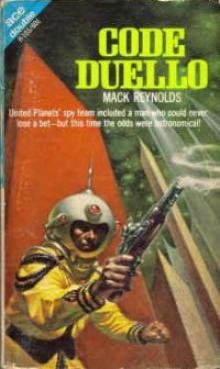 Code Duello up-4
Code Duello up-4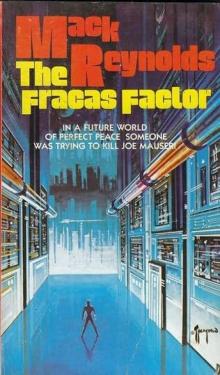 The Fracas Factor
The Fracas Factor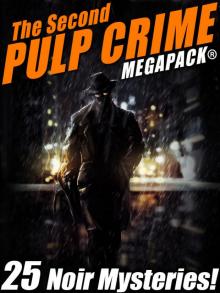 The Second Pulp Crime
The Second Pulp Crime Deathwish World
Deathwish World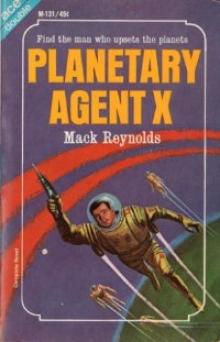 Planetary Agent X up-1
Planetary Agent X up-1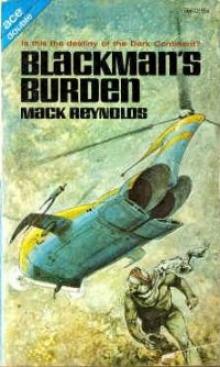 Blackman' Burden na-1
Blackman' Burden na-1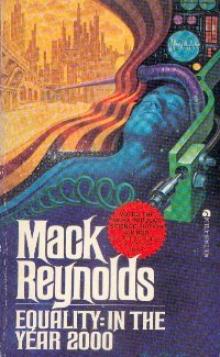 Equality: In the Year 2000 jw-2
Equality: In the Year 2000 jw-2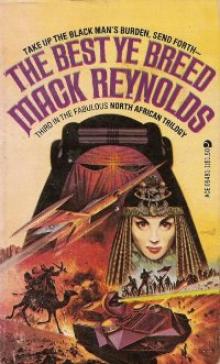 The Best Ye Breed na-3
The Best Ye Breed na-3 The Jet Set
The Jet Set The Rival Rigelians
The Rival Rigelians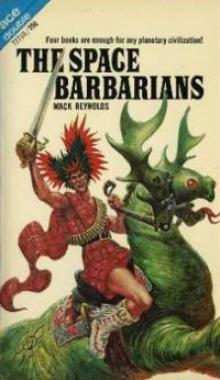 The Space Barbarians
The Space Barbarians